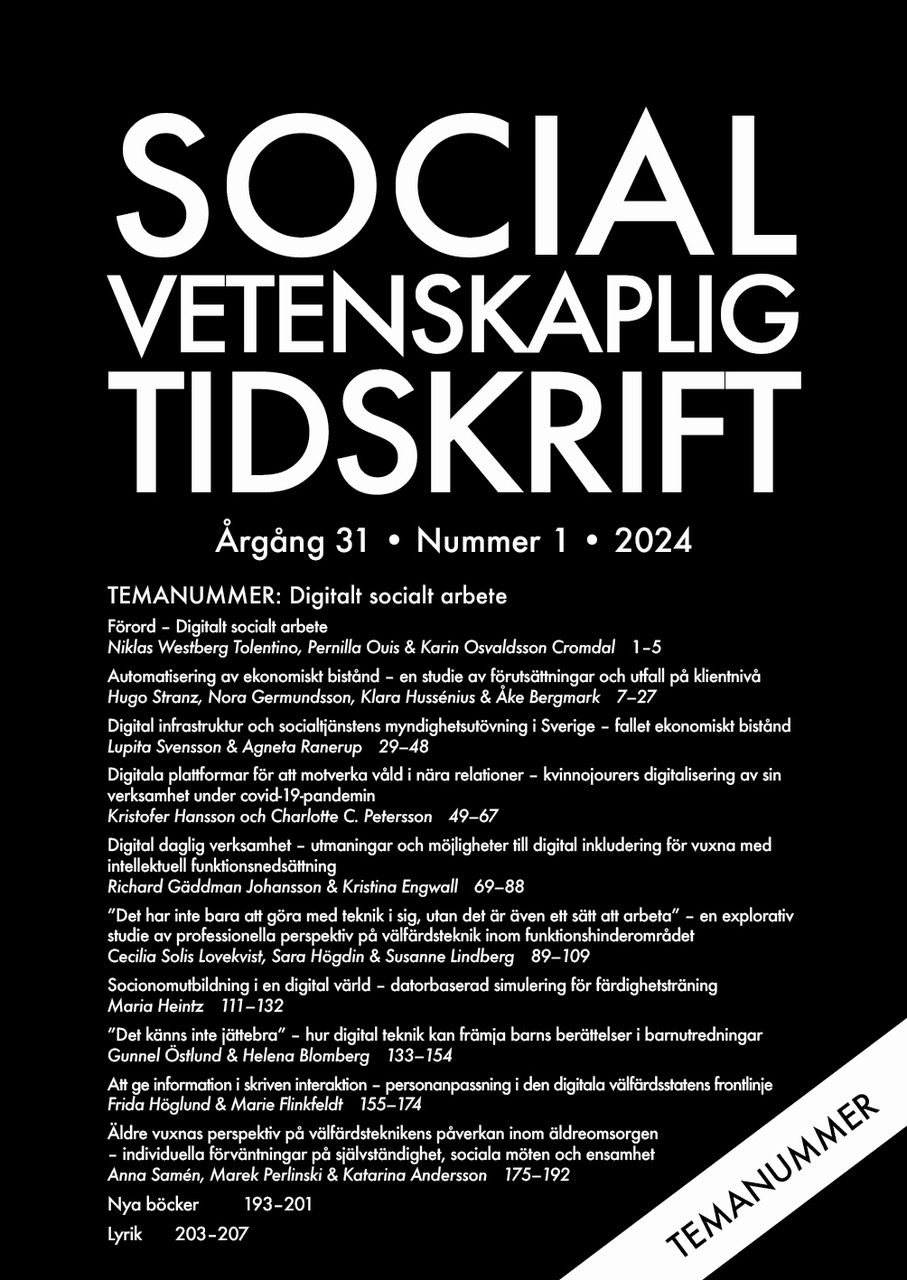Äldre vuxnas perspektiv på välfärdsteknikens påverkan inom äldreomsorgen
– individuella förväntningar på självständighet, sociala möten och ensamhet
DOI:
https://doi.org/10.3384/SVT.2024.31.1.4872Nyckelord:
welfare technology, care, older adults, attitudes, loneliness, independence, social meetingsAbstract
Older adults’ perspective on the effects of welfare technology in eldercare: individual expectations on independence, social meetings and loneliness
Welfare technology (WT) has been identified as a potential solution for challenges within eldercare, with policymakers emphasising its capacity to reduce reliance on care staff. Policy discussions surrounding WT also highlight other anticipated benefits, such as mitigating loneliness, facilitating increased social interaction between caregivers and care recipients, and promoting greater independence for the latter. These expectations are permeated by a techno-optimism. Needing care means being vulnerable, and care builds on relationship and interdependence. How older adults think about WT and its consequences for social aspects of care is important for a successful implementation. The individual perspective is relatively unknown. This study aims to investigate how potential users perceive WT and its consequences for feelings of loneliness, opportunities for social interaction in care settings, and levels of independence. To accomplish this, a questionnaire was administered to approximately 5000 individuals between the ages of 65 and 90 residing in Västerbotten. The findings suggest that the techno-optimism visible at the national level is not widely shared by older adults. A majority expressed skepticism regarding the potential of WT to positively influence social aspects of care, and most of the respondents believe that WT will contribute to increased feelings of loneliness. Furthermore, a majority did not perceive a need for various technologies in eldercare and expressed a preference for care provided by human caregivers rather than technology-based alternatives. These attitudes where not effected by age. The group of 65-year-olds that have grown up with technology and are more digital were as skeptical towards WT as the older age groups. We interpret these results to indicate that the inherent relational nature of care can make it unsuitable for direct replacement with technology. An increased expected frailty and vulnerability that follows from needing to receive care may mean that technology is an inappropriate solution.
Downloads
Publicerad
Referera så här
Nummer
Sektion
Licens
Copyright (c) 2024 Anna Samén, Marek Perlinski, Katarina Andersson

Det här verket är licensierat under en Creative Commons Erkännande 4.0 Internationell-licens.
Allt material i Socialvetenskaplig tidskrift publiceras sedan 2022 (Vol 28 Nr 2) med omedelbar öppen tillgång (open access), under Creative Commons-licensen CC BY 4.0. Upphovsrätten till innehållet tillhör respektive författare.
Allt innehåll i tidskriften är fritt tillgängligt utan kostnad och får fritt läsas, laddas ned, kopieras, delas, skrivas ut och länkas. När innehållet används måste författare, källa och licens anges. Författaren kan fritt göra sin publicerade text tillgänglig på institutionella och internetbaserade arkiv, exempelvis sitt lärosätes digitala arkiv eller andra tjänster för detta.
Inga publiceringsavgifter tas ut vid publicering i Socialvetenskaplig tidskrift.


